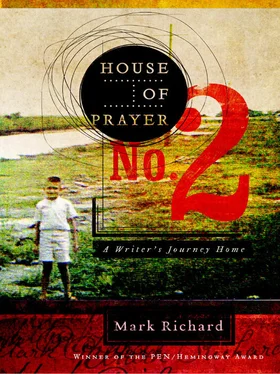When Anstice sells the brownstone, you move into a nightclub kind of performance space in Alphabet City, an old loft where the Communist Party used to print the Daily Worker . Where the printing press used to be the old splattered ink is so thick on the walls of the pit they’re using as a bar that you can’t get paint to stick to it. There’s a lot of performance art going on in New York City, and a lot of it gets performed in your new home. There are two levels, six thousand square feet, a first floor with a stage and an upper level with a balcony and a handful of bedrooms around a large common area. You have one of the bedrooms by the grace of one of the guys who had heard you read there and is a voracious reader himself; his family holds the patent on submarine periscopes.
Sometimes you write a story to read onstage. Some of the other acts include a guy who comes out in a tuxedo and sits at a table on which a solitary candle is burning; there’s a bucket of water placed on the edge of the stage. Silently, the guy in the chair completely undresses while staring at the flame of the candle. When he is naked, he squats on the chair, still staring at the candle. Then he suddenly leaps over the candle and the table, does a forward-roll somersault, and plunges his head into the bucket of water. People applaud.
There are some nasty comics, two guys and a girl who perform War and Peace in fifteen minutes, some guys in blue paint beating drums, and a beautiful girl who performs topless wearing the bottom of a mermaid costume sitting on a stool. She sings “Under the Boardwalk,” and when she’s finished, she tosses her seaweed hair around and blows kisses. You and the guy whose family holds the submarine periscope patent stand in the balcony and clap until your hands are sore and say, Now, that’s art!

GORDON OFFERS YOU A BOOK CONTRACT for ten thousand dollars, which is a lot of money for you at the time, and twice as much as he is able to get some of his other writers. You had gone to his office one day to wait for him and there was a letter he was typing to the publisher that was still in the typewriter, and you see your name so you read it. Gordon makes a plea to the publisher for you, saying you are soul-less and you blush when you see that, until you read the letter again and realize he has written sou-less , without money. When it comes time for you to decide to whom to dedicate your first book, Gordon says To your mother, Claire, of course . Gordon does not know that your mother wakes up every morning before dawn so that she can pray for all the people on her prayer list, names of people she has gathered over the years on a stack of worn three-by-five notecards from which she reads and holds during the two hours each morning she prays. He does not know that after you had your breakthrough in his class, his name has been added to Claire’s prayer list where it remains to this day.
Your book comes out and nothing happens. A friend of yours who works at the Washington Post calls the publicity department of your publisher to get a copy to review, and they tell him you are not one of their authors. When he calls again, they tell him you are dead. You pay off your personal debts and continue to live off the stories you sell to Esquire; they end up buying five of them.
The editors there, Will and Rust, often take you to the Broadway Deli for pastrami sandwiches and manhattans. One time at the end of the lunch you carefully pack the uneaten half of your pastrami sandwich, and Rust asks you why you are doing that, and you confess that you’re broke again, which is no surprise to Will, who lets you borrow and repay two hundred dollars at least twice a month. Over lunch you have been telling them about the summer previous when you were in Virginia Beach and spent an afternoon sitting on your bicycle watching the police retrieve a body that had been sucked into a sand dredge in Rudee Inlet. You were thinking of writing a story called “Where Blue Is Blue,” but you didn’t have it all worked out yet.
At the end of the lunch Rust tells you to come by the office the next day, and when you walk eighty blocks on your hips, you find that he’s not there, he’s just left an envelope with a note. You open the envelope, and there’s a note that says the magazine’s writers do not walk around hungry, and there’s a voucher for an advance against a story he’s commissioning called “Where Blue Is Blue.” You go home and write the story.
When it comes time for your book to go into paperback, the publisher says it may not be going into paperback. The publisher’s office says nobody has been buying your book.
A week later, it’s announced that your book has won the PEN/Hemingway Foundation Award and you’ll be flying to Boston to receive the award from Norman Mailer.
In Boston, you meet Mr. Mailer and the head judge for the award, Josephine Humphreys, and you’re allowed to bring some family and friends, and you fly up your sister and your mother. In your speech you recount your mother bringing you books by the grocery bagful from the library when you were recovering from hip surgery. The ceremony is at the Kennedy Library, and you don’t know it at the time, but Mrs. Onassis is in the audience, and when the speech is over and it’s time for the dinner, she asks that you sit beside her.
Mrs. Onassis asks you a lot of questions about yourself, and you talk about the ocean and sailing, and she says how much she loves those things, and she says her happiest times were always on a boat, and she says especially that one out there, and you see through the window she’s meaning the little sailboat that’s on display at the museum. Your mother can’t believe she’s met Jackie Kennedy, and when it’s over, you think it’s over, but it’s not. In a couple of days one of your roommates at the nightclub performance space tells you he’s been hanging up on someone who keeps claiming to be Mrs. Onassis when she calls. He says once when she identified herself, he said, Right, and I’m the king of Spain! and hung up.
Mrs. Onassis sends you to her brother-in-law’s orthopedic surgeon at the Hospital for Special Surgery. You thank her, but you’ll never go. Just recently you had appendicitis, and when, by the grace of a book-loving physician named Bruce Yaffe, you were admitted, the hospital released you early because you didn’t have insurance. But soon, the orthopedic surgeon’s office is calling to schedule an appointment, and the woman calls every day until you set the appointment and promise to show up.
You see several doctors at the hospital, and they all ask you the same thing: How do you get around? You think they are asking which subway do you take, the No. 6 train? Which crosstown bus? You tell them it depends on where you’re going, you suppose. They become a little impatient. No, where’s your walker, your wheelchair, your crutches, your cane? They show you your X-rays—it’s all bone grinding into cracked bone. They say it’s a wonder you can walk at all. Yeah, I can walk, you say.
Even in the coldest winter a walk across midtown Manhattan has you in a sweat. The doctors are telling you that there is much surgery in your future, but you’re embarrassed to tell them that you have no insurance. Thanks, but you’ll push on. You call the doctors’ office and worry about the bill, but the bills never come. Mrs. Onassis has taken care of them.
In a Sunday afternoon talk with Mrs. Onassis you tell her about the migratory fowl flyways through the Great Dismal Swamp, and she is very interested. You make some calls about when the best time is to take a guided tour, winter probably, or early spring before the bugs and snakes are out. Before you can show her the Great Dismal Swamp, you find out that she has taken ill and has died, though you feel as if you just saw her. One morning you went up to your new publisher’s offices, and her office was near that of your new editor, Nan Talese, and on your way out you were lurching up the hall with Mrs. Onassis on one arm and Nan Talese on the other, and people were sticking their heads out of their offices to see what was laughing and lurching so loud going by, and it was just a very happy you.
Читать дальше













